
views
X
Expert Source
Michelle Shahbazyan, MS, MALife Coach
Expert Interview. 18 March 2020.
Facing Your Feelings

Acknowledge how you feel. Don't hold in the sadness or pretend you're fine. Own up to how you're feeling, as doing so makes it easier to release the emotion and move forward. Label what emotion you're feeling. If someone asks, how you're feeling, be honest and say, “I'm sad.” It's the first step towards healing and getting needed support. If telling someone else about your sadness seems too hard, tell yourself first. Look in the mirror and admit how you're feeling by simply stating, "I'm sad." You might also write down how you're feeling in a journal.

Give yourself permission to be sad. You also don’t want to punish or chastise yourself for being sad. Sadness is a common human emotion that everyone feels, so there's no need to beat yourself up for feeling sad. Allow yourself the space and time to be present in that emotion without judging or criticizing yourself for feeling that way. Do whatever you need to do to let the sadness out. Cry, go lie in your bed, or snuggle up with your pet. To prevent yourself from wallowing for too long in sadness, set a deadline. You might give yourself 1 or 2 days (or more, depending on the situation) to be sad. Then, commit to changing your mood with more upbeat activities, such as listening to energetic music, exercising, or hanging out with friends.
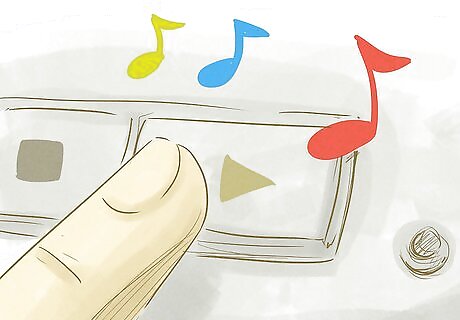
Find creative outlets for your feelings. Channel your sadness into creative expression. By writing poetry, stories or songs or by drawing or painting, you can express and release your sadness in a positive, meaningful way. Draw a picture that depicts how you feel or listen to music that moves you. Despite what you may believe, sad music won't necessarily make you sadder. In fact, many people find they get an emotional boost after hearing sad music that helps them feel better afterwards.
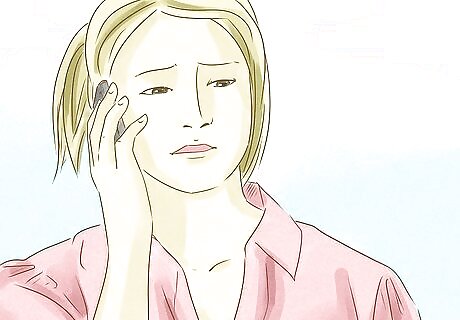
Remember how you got through previous periods of sadness. It's important to recognize that sadness, like any other emotion, is temporary. The best way to do that is to remember another time you felt sad and reflect on how you came to feel better. Thinking back can help you feel more capable of dealing with sadness because you already know you have before. Plus, you might recognize positive coping strategies that have been helpful previously, such as phoning a friend or playing with your pet.
Keep a journal to help you identify causes and move forward. It may be helpful and enlightening to write down your thoughts and feelings in order to determine what’s causing your sadness. From this point you can take a step towards feeling happy again. If you think that your sadness may be situational, write down the specific events and/or situations that are making you sad, such as a stressful job or a difficult financial situation. This may help you come up with possible solutions to help your situation. If you think that your sadness is mental, work on becoming aware of the types of thoughts you are having, as this will be helpful to know when you seek professional support. Write down as many thoughts as you can, as they will usually uncover deeper beliefs.
Lifting Your Spirits
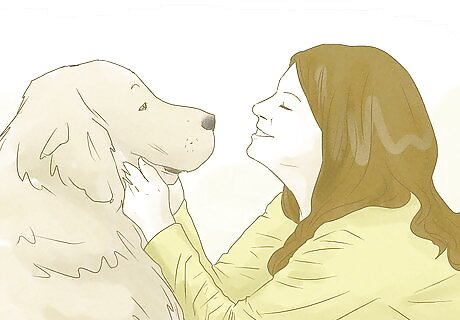
Get physically active. When you're sad, you may only want to lie around--and that's okay for a while. Eventually though, it can help to push yourself to get up and move around. Physical activity stimulates the release of endorphins which act as feel-good chemicals for the brain. Walk around the block, play fetch with your dog, or have a dance party with your best friend.
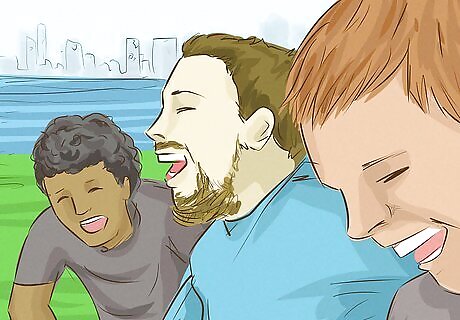
Laugh. People with a sense of humor are more resilient in tough life situations, so try to find ways to laugh. Hang with a buddy who's known to be a jokester or queue up your favorite comedy film or TV show.

Do things you enjoy. A great way to move through sadness is by spending time on hobbies or passions. These are often anchors that bring joy despite unhappy circumstances. If you love playing tennis, schedule a few matches this week. If you like to bake, try out a new recipe with a loved one.
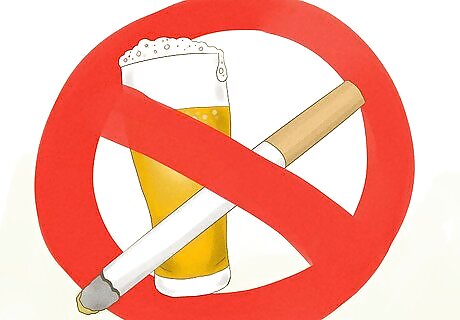
Avoid unhealthy coping. Alcohol, drugs, junk food, and excessive shopping can feel good when you're sad. These activities only numb the pain temporarily, though. They may even plant seeds for addictive or destructive behavior down the line. Resist the temptation to turn to such activities when you're sad by keeping them out of reach. Limit your access to alcohol, drugs, or junk food (stock your fridge and pantry with healthy foods) and withdraw the amount of cash you need for everyday expenses and hide your credit cards. Instead of engaging in unhealthy coping, make time for positive self-care activities.
Getting Help
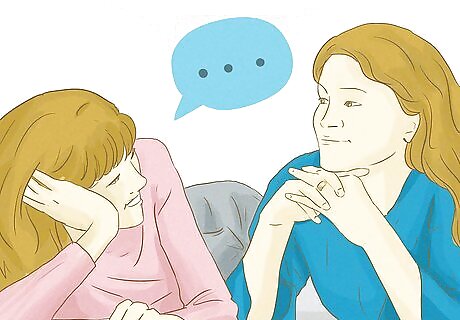
Spend time with supportive people. Look to your loved ones for strength and encouragement when you're feeling sad. Just having someone to be there for you can help, but you might also make specific requests as to how they can help. For instance, you might ask your partner to cuddle or ask your friend to sit with you as you look through photos of your deceased father. Let your inner circle know how they can help. Avoid isolating yourself, as this can make your feelings worse and cause you to ruminate on your sadness.
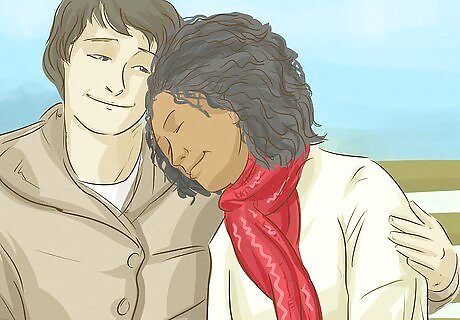
Get some accountability. If you're sad, you might have trouble going about your normal daily activities. Reach out to those around you for accountability. Ask your roommate to make sure you get up and get dressed in the morning. Or, ask a friend at work to stay on you about completing an important project. Make a list of the things you want or need to do and mark off tasks as you complete them. This may help you stay motivated and active.
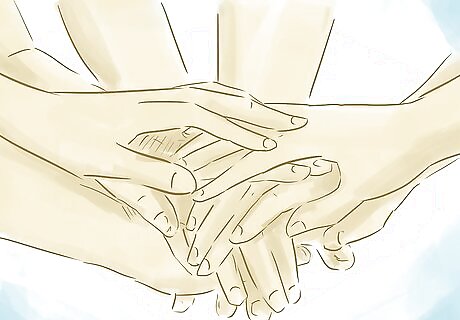
Join a support group. Talk through your feelings with others who can relate. Participating in an in-person or online support group is a wonderful way to connect with others and get support. If you've lost a loved one, you might join a bereavement group. If you're struggling to come to terms with a terminal diagnosis, you might join a support group for cancer patients.
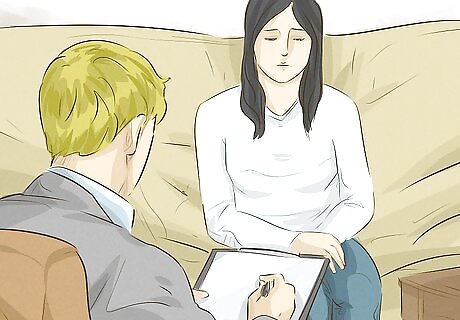
See a counselor if sadness affects your ability to function in life. Sometimes, despite your best efforts, sadness doesn't go away on its own. It can even fester into something more serious, like depression. If you need help coping with sadness, visit a professional counselor. You might feel better simply because you have someone impartial to talk to. However, your counselor can also suggest techniques for dealing with sadness, such as journaling or practicing gratitude. While general sadness is usually temporary and revolves around something external, depression is typically more internal and chronic. It has a tendency to make everything feel less enjoyable and is usually not tied to one specific event. Depression often includes feeling of fatigue, problems concentrating, lack of sleep or appetite, and feelings of worthlessness or guilt..
Get a physical to rule out physical causes of sadness. Consider getting a physical to see if your sadness is caused by physical factors such as blood sugar or low vitamin D. These are known to cause feelings of sadness, and can be easily treated.


















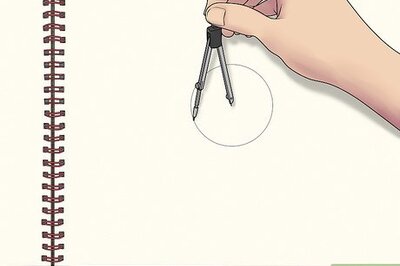

Comments
0 comment